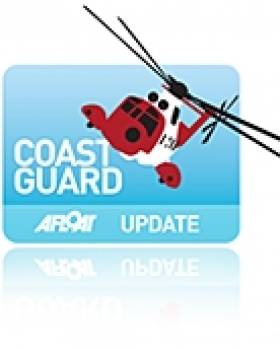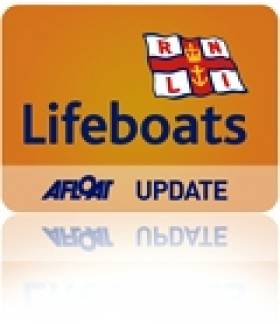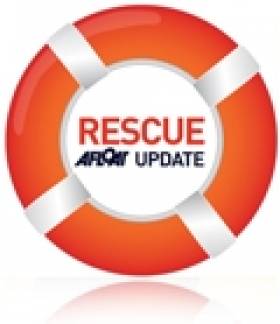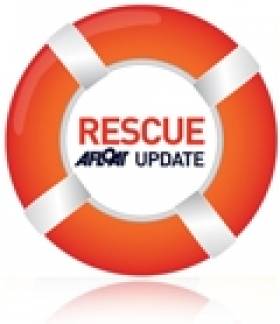Displaying items by tag: missing
Search for Missing Spanish Fisherman Off Southwest
#Coastguard - The Irish Coast Guard's Rescue 115 helicopter was tasked overnight to search for a missing Spanish fisherman who fell overboard from his fishing trawler off the southwest coast in the early hours of this morning.
98FM is reporting the latest news on this incident, saying that the man went into the sea some 25 miles off Mizen Head.
The alarm was raised around 4am and the coastguard station at Valentia is co-ordinating the search and rescue effort, with RNLI lifeboats from Baltimore and Castletownbere in West Cork assisting.
Wreckage Found in Search for Missing Yachtswoman Off Cornwall
#NEWS UPDATE - The Independent reports that the wreckage of a vessel has been found in the search for a missing yachtswoman off the Devon and Cornwall coast.
As previously reported on Afloat.ie, 65-year-old Ona Unwin left Falmouth in Cornwall on Friday in a yacht purchased just the day before.
She was last reported in Mousehole, near Penzance, on Saturday evening after rounding the bottom of the Cornish coast. Relatives raised the alarm on Sunday after she failed to return home to Bideford in Devon.
Devon and Cornwall Police were with members of Unwin's family yesterday afternoon when air and sea search crews discovered the wreckage near Sennan Cove in Cornwall which is believed to be that of her 31-foot Seagair yacht.
No evidence of a body was seen on board the wreck, and a police spokesman said investigations are ongoing.
Meanwhile, it has emerged that Unwin is thought to have dismissed safety warnings about "treacherous" weather in the region over the weekend when she set out.
"I was amazed when I found out that she had set sail," said Jerry Hobkirk, proprietor of Falmouth Yacht Brokers which sold her the yacht last Thursday. "If I had known, we would have stopped her."
Surface Search for Missing Diver Winds Down
#MISSING DIVER - Teams were still searching yesterday at a wreck site off Cape Clear for a diver missing since Tuesday, according to The Irish Times.
A Defence Forces spokesperson told the paper that a sonar device would be employed to scan the seabed for any sign of 54-year-old Reinhardt Teschke, who failed to resurface from a 90m dive on the wreck of British merchant vessel the Minnehaha.
As previously reported on Afloat.ie, Baltimore RNLI launched both its inshore and all-weather lifeboats to the scene south of Balitmore Harbour in West Cork on Tuesday evening to search for the German diver, one of a party of three at the wreck site.
Irish Coast Guard helicopter Rescue 115 and the Naval Service vessel LE Ciara were also involved in the surface search, which was set to be wound down yesterday.
Body Recovered From Avoca River Confirmed As Missing Teen
#NEWS UPDATE - RTÉ News reports that a body found in the Avoca River in Co Wicklow yesterday is that of James Sheehan.
The 18-year-old from Arklow went missing in the early hours of Sunday 19 August after a night out.
Gardaí and search teams recovered his body from the river near the south quay in Avoca yesterday evening. A post-mortem will be carried out at Loughlinstown Hospital later today.
Body Recovered After Sailing Dinghy Overturns Off West Cork
#MISSING BOATS - The Irish Times reports that the body of a man in his 60s has been recovered from the sea off West Cork in the early hours of this morning.
The body, believed to be that of John O'Leary from Allihies, was found as part of a major search operation after the sailing dinghy carrying the man and his 18-year-old son Christopher overturned off the Beara Peninsula yesterday evening.
According to RTÉ News, the two spent four hours clinging to the boat before swimming towards the shore. Christopher reached land almost 1km away to raise the alarm but his father went missing in the interim.
The boat was discovered around 8pm with no sign of John O'Leary in the vicinity, according to the Irish Independent.
The Irish Coast Guard at Valentia co-ordinated the search operation from 9pm last night, and volunteers with the Castletownbere RNLI lifeboat recovered a body off Cod's Head around 1.30am. A postmortem will be carried out later today at Cork University Hospital.
Meanwhile, the search continues for a missing fishing boat off Co Clare.
The Lady Eileen, with two crew on board, was due to return to Quilty yesterday evening.
Coastguard search teams discovered debris and diesel in the water near Spanish Point before the search was postponed due to low light.
Garda divers have been asked to assist in the search and are due in the area around midday.
#NEWS UPDATE - The body found in a river in the Polish town of Bydgoszcz has been confirmed to be that of missing Irish football fan James Nolan.
As RTÉ News reports, Nolan was last seen in the early hours of Sunday 17 June while socialising with Irish friends at a bar in the town.
It is believed that he fell into the River Brdo at some point while walking back to their hotel. His body was recovered some 200m from his last confirmed sighting.
The Irish Times repeated local media reports that there was no sign of injuries on the body, but the cause of death could not yet be determined, pending the results of a postmortem due to take place yesterday.
Tánaiste and Minister for Foreign Affairs Eamon Gilmore has expressed his sympathies to the family of the 21-year-old environmental engineering student from Blessington, Co Wicklow.
He added that the Irish Ambassador to Poland, Eugene Hutchinson, is remaining with the Nolan family in Bydgoszcz.
Search Ends for Missing Sailors in San Francisco Yacht Tragedy
#MISSING SAILORS - The US Coast Guard last night suspended its search for four yacht crew members - including two Irish sailors - who went missing after what's being described as San Francisco's worst ever sailing accident, Fox News reports.
Petty Officer Caleb Critchfield told the Associated Press: "There's a window of survivability and we searched well beyond that window."
Boats and aircraft had combed over 5,000 square miles of ocean in a marathon 30-hour operation before the search was halted at sunset last night. It is not expected to resume.
As previously reported on Afloat.ie, the missing include Irish yachtsmen Alan Cahill, originally from Blarney in Co Cork, and his friend Elmer Morrissey, who had moved to the US for work only last year, according to friends and colleagues on Facebook.
The two men, along with fellow crew Jordan Fromm, Alexis Busch and Marc Kasanin, were thrown into the frigid water after their 38-foot yacht Low Speed Chase ran aground at the Farallon Islands, some 25 miles off the coast of San Francisco in northern California.
Three other crewmembers, including the boat's owner and skipper James Bradford, were rescued from the rocks shortly after the incident. The body of Kasanin, 45, was recovered from the water hours later.
The boat had been competing in the Full Crew Farallones Race with 40 other yachts between San Francisco and the islands when the tragedy occurred.
Known for its rough conditions with 14-foot swells and winds of up to 20 knots, the near-century old tradition has "never been for the faint of heart".
#MCIB - The families of two fishermen found dead at sea off the Skerries last April may never uncover the circumstances that led to their demise. But the official report into the incident indicated that the absence of lifejackets was a significant contributing factor.
Ronan Browne (26) and David Gilsenan (41) were reported missing on the evening of 1 April after failing to return from a trip tending to lobster pots.
Their vessel, Lady Linda, was found the following morning upturned in an oil slick off Clogherhead with no sign of the crew.
It wasn't until a week later that their bodies were discovered caught in the vessel's fishing gear some five miles east of Clogherhead, as previously reported on Afloat.ie.
Post-mortem results found that both men died from drowning, with Gilsenan also showing signs of hypothermia.
With no eyewitnesses to the incident, the report by the Marine Casualty Investigation Board (MCIB) indicated a number of possible causes from eqiupment malfunction or shifting of lobster pots on deck, to the wave height and weather conditions on the day, which were reportedly deteriorating when the boat left port.
It also said that Browne and Gilsenan "were lifelong friends, both men were experienced and qualified marine engineers in the fishing vessel industry. Both men were experienced in boat handling and fishing and had worked together on many occasions."
But the report emphasised the lack of personal flotation devices (PFDs) on board, and noted that emergency equipment was stored under the deck and not easily accessible.
The MCIB's recommendations include a review of the code of practice for fishing vessels under 15m to establish "revised stability critera" and ensuring that all boats are fitted with automatic radio beacons that deploy upon capsize.
In a separate incident, lack of proper maintenance led to an unlicenced boat taking on water off Co Kerry last August.
The Claire Buoyant was carrying one crew, five passengers and 21 sheep from Beginish Island to Ventry when the vessel began to lose stability.
Skipper Eoin Firtear - who the MCIB described as having "limited sea-going experience" - and his five passengers were rescued by passenger ferry. All sheep were jettisoned overboard, with 18 eventually recovered.
The report reminded that the carriage of livestock should only be undertaken in appropriately certified vessels.
- MCIB
- Marine Casualty Investigation Board
- report
- Lady Linda
- Clogherhead
- Ronan Browne
- David Gilsenan
- lobster pots
- Fishing
- drowning
- hypothermia
- missing
- malfunction
- wave height
- Weather
- lifejackets
- Personal Flotation Devices
- PFDs
- Code of Practice
- stability
- Radio
- beacon
- maintenance
- unlicenced
- Co Kerry
- Claire Buoyant
- Sheep
- Passengers
- Beginish Island
- Ventry
- Eoin Firtear
- Skipper
- Rescue
- Livestock
Search Scaled Down for Missing Crewman in Irish Sea
#RESCUE - BBC News reports that the search for a cargo ship crewman missing in the Irish Sea has been scaled down.
The 22-year-old from Slovakia was reported missing yesterday morning from the Fehn Sirius, which was en route from Belfast to Portugal, as it headed past Arklow, Co Wicklow.
According to The Irish Times, he was last seen on the cargo ship around 10pm on Monday night as it headed south of the entrance to Strangford Lough.
Lifeboats from Portaferry and Newcastle in Northern Ireland and Arklow joined the search and rescue operation, which was assisted by the RAF helicopter based at Prestwick in Scotland and an Irish Coast Guard helicopter.
However, most rescue services have now been stood down as the Fehn Sirius continues to backtrack in the Irish Sea, with assistance from the Naval Service vessel LE Ciara.
Only three days ago the body of another mariner was recovered from the Irish Sea off the north Dublin coast, more than a month after he went missing.
Body Recovered Off Dublin Thought to Be Missing Fisherman
#RESCUE - The Evening Herald reports that a body recovered 14km off the coast of north Dublin on Sunday is believed to be that of a missing fisherman.
The grisly find was made by the fishing vessel Rath Eilte in the waters off Skerries. A post-mortem was set to be carried out yesterday to determine the cause of death.
Found fully clothed in black and yellow oilskins, the remains are thought to be those of a Ukrainian in his 30s, a crewman on the Kilkeel-registered Zenith who was reported missing some 14.5km off Clogherhead in Co Louth on 29 January.






































































